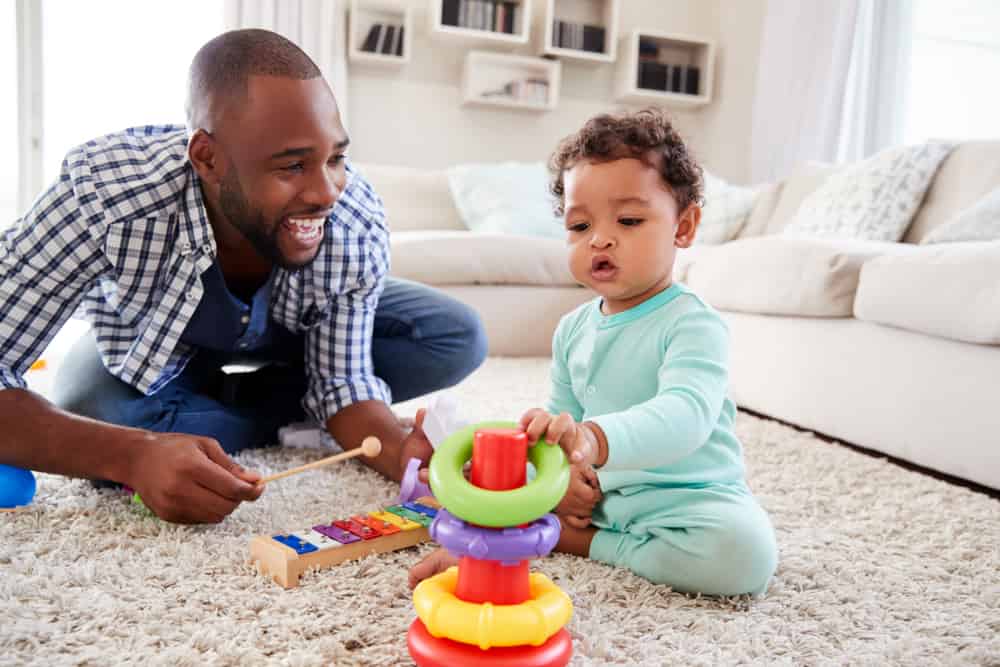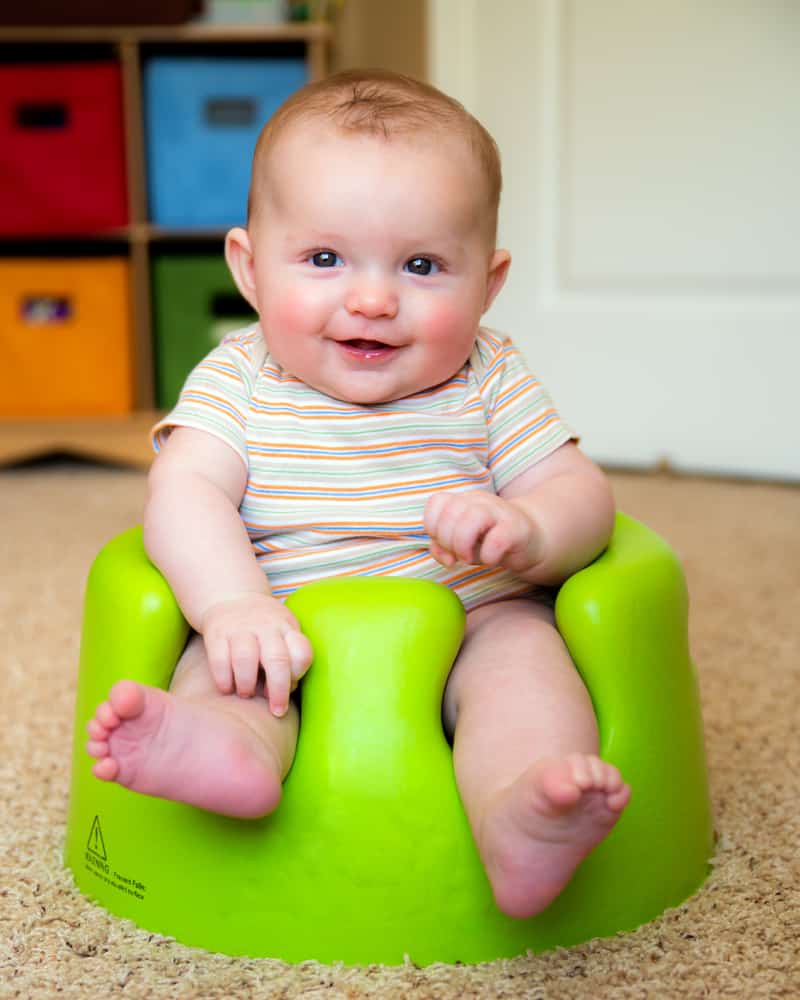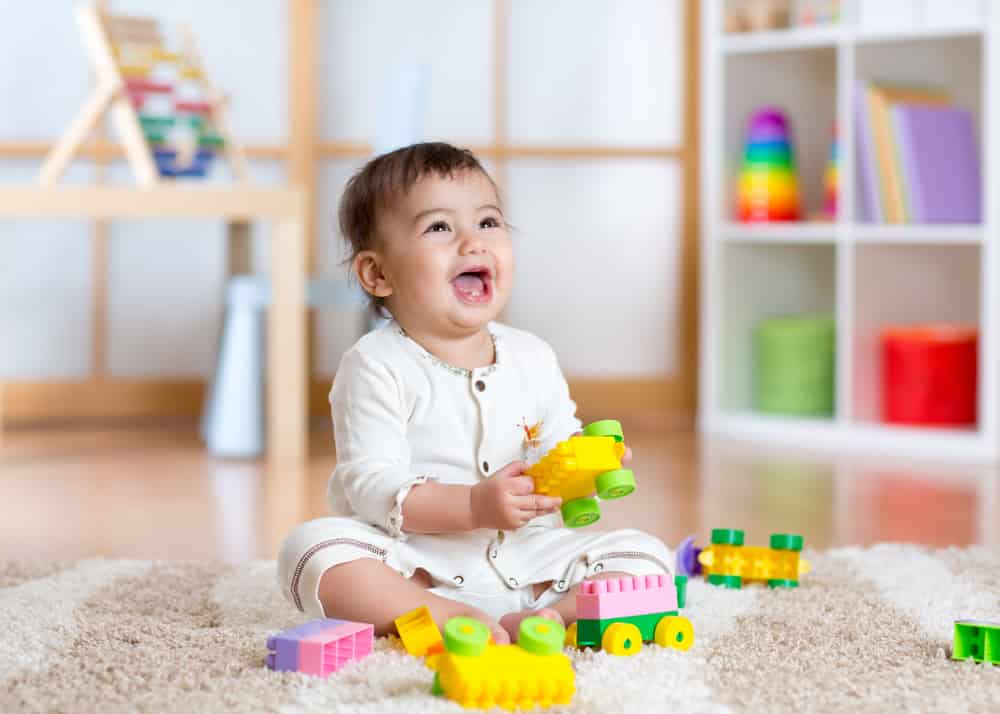When it comes to your baby's development, sitting up independently is one of the milestones that you are looking forward to! A baby usually sits up on their own between four and seven months, and this is an essential step in your baby's physical development. Here is when they learn to use their muscles to control their movements. As they become more mobile and explore the world around them, learning to sit up is a crucial milestone in their growth.
Key Points
- While most babies begin sitting up on their own between four and seven months, some babies may take as long as 12-14 months to reach this milestone.
- Your baby will need your support as they first begin learning how to sit up. You should seat them in supportive chairs at this time, as well.
- If your baby has not reached this milestone by nine months, you may want to contact their pediatrician. While it could be nothing to worry about, it's worth being sure.

©Aimee Pool Photography/Shutterstock.com
When Should My Baby Sit Up On Their Own?
Babies' age for sitting on their own can vary widely due to several factors. Every baby develops differently, and it’s important to remember that all babies are unique. Some may be ready to sit up at 6 months, while others may take as long as 12-14 months before they have the strength, balance, and coordination needed for this milestone.
Factors like physical development, muscle strength, and coordination all play a role when your baby can sit up on their own. Furthermore, some babies may have underlying medical conditions that delay the process of learning how to sit independently.
It's important to remember that babies need time and practice before they can master this critical developmental milestone.
How to Help My Baby Sit Up
Babies are always eager to explore and grow. Helping your baby sit up is a crucial turning point on their development journey. It helps them become more independent, can improve their motor skills, and can even help to boost cognitive development. But how do you help your little one achieve this milestone? Here's how;
Choose proper support: When helping a baby to sit up, it's vital to choose the right type of support. Consider using a supportive chair or boppy pillow designed for infants to help provide additional back and neck support.
Start slowly: Before having the baby sit up entirely on their own, help them get accustomed to sitting up with your support. Start by sitting the baby upright in your lap and slowly. Over time, increase the weight placed on their legs as they become stronger and more comfortable with being supported.
Help them maintain balance: Hold onto the baby's arms or waist while sitting to help them retain their balance. Do this until they become strong and comfortable enough to do it independently.
Encourage them to explore: Allow the baby to explore and move around in their supported position. Once they can, encourage them to move and reach for toys placed in front of them to help strengthen their muscles and increase their confidence.
Provide supervision: Never leave the baby unattended once they are sitting up. Because they may not be able to support themselves correctly on their own yet, they could potentially fall or injure themselves. It's crucial to provide supervision until they become older and more comfortable sitting up independently.
Keep practicing: It takes time and lots of practice for babies to learn how to sit on their own. Be patient and keep encouraging them as they grow.

©Monkey Business Images/Shutterstock.com
Items Needed To Help Your Baby Learn To Sit Independently
These may include a cushion to help support the lower back and baby-proofing products like corner and edge bumpers. You can also use toys that encourage your baby to reach up and grab them. An activity station hung from a door frame, or wall is also a great idea.
When baby is ready to learn to sit without help, you should be aware of their physical limitations. Start by helping your baby find balance while in an assisted sitting position, using a cushion or other supportive item to help them keep their back straight.
If your baby does not have the muscles to hold their body up in an unsupported sitting position, you can use a baby floor seat. This will help them learn how to balance and sit. Use cushions, mats, or pillows around the seat to provide extra comfort and stability. As your baby develops more control and strength of their core muscles, you can gradually reduce the support until they are ready to sit without supervision.
Remember to always supervise your baby when they sit. Please ensure that their head and neck align with their spine. Also ensure that they are not leaning too far forward or backward.
Also, be aware of any objects that may pose a risk of harm if your baby falls over. With the correct items and supervision, you can help your baby learn how to sit independently in no time.
When To Worry When Your Baby Is Not Sitting Up
If your baby is not interested in sitting up by nine months, it may be time to contact their pediatrician. Similarly, if you notice that your baby is struggling to sit up or losing the ability to do so, call your baby's doctor. Your pediatrician can assess whether there are any underlying medical concerns at play.
They can provide strategies to help your baby become more comfortable with their development and suggest activities to build strength and balance. If necessary, consult an occupational therapist or physical therapist to support your baby’s progress.
Note that all babies develop at different rates and that it is perfectly normal for infants. However, if you notice developmental delays or have concerns about your baby’s progress, it is always best to speak with a pediatrician.
Remember, one of the most important things you can do is to provide your baby with a loving, nurturing environment and to follow their doctor’s instructions.

©Rob Hainer/Shutterstock.com
Causes of Delayed Sitting In Babies
Delayed sitting is a common concern among new parents. It can be an unnerving experience, as it can be challenging to determine why your baby isn’t reaching their milestones on time. While there are several potential causes for delayed sitting in babies, some of the most common include the following;
Low Muscle Tone – Babies with low muscle tone may find it difficult to sit up on their own. This is because they don’t have the strength in their muscles to support themselves and maintain balance.
Prematurity or Cognitive Delay – Babies with cognitive delay may take longer to achieve developmental milestones, including sitting up.
Poor Head Control – Babies who lack control over their head movements may have difficulty sitting up on their own as they cannot support and balance themselves when upright.
Weak Core Muscles – This can prevent a baby from being able to sit upright, as they may lack the strength to support themselves.
Pain or Discomfort – Babies experiencing pain or discomfort due to a medical condition or injury may have difficulty sitting up as their body is trying to protect itself from further harm.
Environmental Factors – Babies can delay sitting due to environmental factors. These include not having enough floor space or being placed in an overly cushioned seat that prevents them from using their muscles to support themselves.
Medical Conditions – Certain medical conditions may also cause a delay in sitting, such as Down Syndrome, Cerebral Palsy, or Muscular Dystrophy.
Foods That Help Accelerate a Baby's Sitting Age
These should provide adequate nutrition for developing strong bones, muscles, and nerves. Foods rich in iron, such as lean meat and poultry, fish, beans, and nuts, can help babies build strength in their arms and legs.
Iron-fortified cereals, pasta, bread, and other grains are also beneficial for muscle development. Calcium-rich foods like yogurt, cheese, milk, and fortified cereals are essential for strong bones. Omega-3 fatty acids found in fish, including salmon and tuna, can help create healthy connections between nerve cells in the brain that help babies develop their coordination and physical control.
Vegetables and fruits provide essential vitamins and minerals necessary for proper growth and development. Offering a variety of healthy foods from all the food groups can help your little one reach the goal of sitting up independently.
Provide your baby with plenty of tummy time, so they can practice using their arms, legs, and core muscles. Regularly encourage them to try new things as they develop more strength and confidence to master new skills.
Lastly, it's vital for you as a parent or caregiver to seek guidance from your pediatrician about when you can expect your baby to reach this milestone. With a nutritious diet, enough sleep and plenty of practice, your baby can soon sit up independently!
How Many Hours a Day Should Babies Sit?
Many factors determine how many hours a day babies should sit upright. These include the baby's age, physical development, and any medical conditions they may have.
It is recommended for young infants to limit time spent sitting to no more than 30 minutes at a time, with breaks every 20 minutes. As babies get older and more physically developed, they can begin to handle more extended periods in the seated position.
Consider your baby's individual mobility needs when determining how many hours a day they should sit. Babies with medical conditions such as muscular dystrophy or cerebral palsy may need extra assistance while sitting and may be unable to stay seated for extended periods.
When it comes to safety, you must provide adequate support for your baby while they are in a sitting position. Always give plenty of support around the trunk and head since baby's neck muscles may not be strong enough to hold up their head yet. Remember to securely attach your seat of choice to a surface that won't slide or tip over, such as the floor or a chair.

©Oksana Kuzmina/Shutterstock.com
What Milestone Comes Next?
Once your baby begins sitting, you might be wondering what milestone you should be looking forward to next. Most babies will move to the crawling stage once they begin sitting up on their own. This will begin happening fairly quickly in most cases, with a lot of babies mastering this skill by ten months. Some babies skip the crawling stage entirely and move straight to attempting to stand and walk!
If several months pass by once your baby can sit up on their own and they haven't made any move to crawl or stand, consider contacting their pediatrician.
Conclusion
The age at which a baby should be able to sit up on its own can vary from baby to baby. Most babies can do it by six months of age or when they can hold their head up for extended periods and have strong and coordinated trunk muscles.
Babies should be allowed to develop at their own pace, so there’s no need to rush them into sitting up. Always consult a pediatrician if you have any concerns or questions about your baby's development.
The image featured at the top of this post is ©Prostock-studio/Shutterstock.com.
